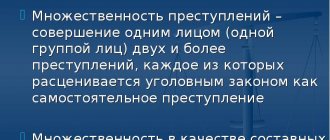Recidivism in Russian criminal law
Recidivism of crimes is taken into account by the court when assigning punishment. Recidivism entails increased criminal liability measures, or (if the previous sentence has not yet been served) the application of sentencing rules based on the totality of sentences. Until 2003, recidivism was also taken into account in the articles of the special part of the Criminal Code of the Russian Federation as a qualifying feature of certain crimes.
Recognition of a person's actions as a relapse of crimes in the presence of all signs of a relapse of a certain type is the responsibility of the court. Recidivism is an aggravating circumstance. In this case, in the absence of mitigating circumstances, the person is sentenced to no less than one third of the maximum term of the most severe type of punishment provided for in the relevant article of the Special Part of the Criminal Code of the Russian Federation (Part 2 of Article 68 of the Criminal Code of the Russian Federation).
Recidivism also influences the choice of correctional institution in which to serve a sentence of imprisonment: men with relapse and dangerous recidivism of crimes serve their sentences in high-security correctional colonies, and with particularly dangerous recidivism of crimes - in special-regime correctional colonies or prisons. Recidivism does not affect the choice of place of imprisonment for women.
Features of the Institute
In the science of criminal law, recidivism is not considered as a monotonous category. It is considered comprehensively, as the main indicator of the crime of the same name. At the same time, relapse, the concept, types, the meaning of which is presented in the article, is characterized by the following features:
— multiplicity, that is, any relapse is another commission of a crime;
— separate specialization (committing homogeneous crimes);
- differentiation (commitment by a person of exclusively heterogeneous crimes).
The meaning of recidivism
More precisely, why such a concept as “recidivism” was introduced into the Criminal Code of the Russian Federation.
The main task of criminal liability is not so much to punish the criminal as to rehabilitate him, as well as to protect society from persons dangerous to him. Therefore, if a criminal, having been released, again goes against the law, then the court considers that the prison sentence did not change him for the better, but on the contrary. Often such persons become extremely dangerous to the people around them.
That's why:
- Recidivism of crimes is considered a ground aggravating criminal punishment (Article 63 of the Criminal Code of the Russian Federation);
- It becomes a circumstance influencing the choice of place of imprisonment in correctional institutions (Article 58 of the Criminal Code of the Russian Federation);
- The term of criminal punishment for committing a crime when a recidivism is recognized is calculated as follows (Article 68 of the Criminal Code of the Russian Federation): At least 1/3 of the maximum term allowed for this crime;
- If there are aggravating circumstances of committing a crime, the judge will choose the most severe type of punishment provided for in the article for committing this crime.
Signs of relapse
Signs of relapse:
a) the person has committed two or more independent intentional crimes;
b) the distance of the crimes that form a relapse from each other by a certain period of time;
c) having a criminal record for a previous crime. These signs make it possible to distinguish recidivism from a totality of crimes.
Types of relapse
The Criminal Code of the Russian Federation knows three types of recidivism:
- Simple. Commitment of an intentional crime by a person who has a criminal record for a previously committed intentional crime. In case of simple recidivism, the type of punishment previously imposed on the person does not matter.
- Dangerous:
- a serious crime for which a person is sentenced to actual imprisonment + two or more crimes of moderate gravity for which the person was previously convicted;
- grave crime + grave or especially grave, for which a person was sentenced to actual imprisonment.
- Particularly dangerous:
- a serious crime for which a person is sentenced to real imprisonment + two serious crimes for which a person is sentenced to real imprisonment;
- especially grave crime + two grave or 1 particularly grave.
General and special type of recidivism
Criminal law is considered one of the most complex, since legislators needed to provide for all possible situations when committing crimes, so that each guilty person received exactly what they deserved, no more and no less.
Also read: The concept and signs of theft of someone else's property
Therefore, the following classification of recidivism of crimes according to the nature of its occurrence was established:
- General relapse
These are situations in which the offender commits a crime again (intentionally), but it is not identical to the old one. For example, he was previously convicted of robbery, and two years later he is accused of murder. In this case, recidivism will be common.
- Special relapse.
This is the repeated intentional commission of the same crime as previously with a previous conviction for it. That is, if a criminal previously served a sentence for murder, then with a second murder committed after his release from prison, his actions will be classified as a special recidivism.
Assignment of punishment for relapse
The Criminal Code of the Russian Federation establishes that:
- The term of punishment for any type of recidivism of crimes cannot be less than one third of the maximum term of the most severe type of punishment provided for the crime committed (if there are no mitigating circumstances).
- When assigning punishment for a recidivism, dangerous recidivism or especially dangerous recidivism of crimes, the nature and degree of public danger of previously committed crimes, the circumstances due to which the corrective effect of the previous punishment turned out to be insufficient, as well as the nature and degree of public danger of newly committed crimes are taken into account.
Convictions that are not taken into account when recognizing recidivism
When recognizing a relapse, the following are not taken into account:
- Convictions that were annulled in accordance with the procedure established by law, that is, removed or expunged, including as a result of an amnesty or pardon.
- Convictions for intentional minor crimes.
- Convictions for reckless crimes.
- Convictions for crimes committed by a person under the age of eighteen.
- Convictions for crimes for which the conviction was recognized as conditional, if the probationary period was not canceled and the person was not sent to prison to execute the punishment.
- Convictions for which a deferment of execution of the sentence was granted, if the deferment of execution of the sentence was not canceled and the person was not sent to prison to serve the sentence.
Term of punishment
The Criminal Code of the Russian Federation (Article 68) determines that the permissible term is at least 1/3 of the longest term of the most severe punishment provided for the crime.
When determining a preventive measure, the court is guided by the nature of previously committed unlawful acts and the degree of public danger that they carried.
Also analyzed are the circumstances in which the previously prescribed preventive measure by the court did not allow the necessary corrective impact on the citizen.
The nature of recent crimes that constitute a relapse is also subject to assessment.
All circumstances of these offenses and the degree of their social danger are also considered.
There are a number of circumstances that are mitigating .
They reduce any punishment applied in the case. A similar condition also applies to cases involving recidivism.
In this case, the term facing the violator may be less than 1/3 of the maximum term of the most severe punishment.
Mitigating circumstances include, for example, pregnancy, the presence of young children, mental or physical coercion to commit a crime, etc.
Special order
A special way of considering cases can significantly save time, effort and money of authorized bodies fighting crime.
In a special procedure, the accused citizen files a petition in which he expresses his agreement with the guilty verdict brought against him.
As a result, the consideration of the issue takes place according to a simplified scenario. Law enforcement agencies no longer need to study and evaluate evidence in the case, since the accused person independently admits his guilt.
An important condition is the consent of the other participants in the process: the prosecution, the injured party.
If one of them protests, then the case cannot be considered in a special manner. In this case, the issue is resolved on a general basis.
During the hearing, the judge must ask the defendant whether he agrees with the charges brought against him, whether he clearly understands the essence of the guilty verdict, whether he understands the content of the petition he filed, whether the decision was voluntary (or made after consultation with a representative of the defense), etc. .d.
Also read: Sample resolution to initiate a criminal case: how to draw up a document
the victim is present at the meeting , the essence of the special procedure for considering the issue is also explained to him and his consent is obtained to pass a sentence in a similar way.
It should also be taken into account that the special procedure applies only to crimes where the possible maximum is 10 years in prison.
The Code of Criminal Procedure of the Russian Federation (Article 316) states that in special cases the punishment imposed by a judge does not exceed 2/3 of the longest term provided for in the relevant article.
Problems of sentencing
The following criteria are subject to assessment:
- categories of crimes (latest, previously committed);
- the number of criminal records that a citizen has;
- whether the accused was previously sentenced to actual prison terms;
- age of the offender;
- the form of his guilt (direct, indirect intent, mixed guilt);
- types of punishment;
- extenuating circumstances.
Only the assessment of all of the above criteria allows the authorized bodies to objectively assess the current situation and make an objective decision regarding the criminal.
Thus, criminal law provides for certain conditions that exclude relapse :
- legally annulled criminal records (removed, expunged);
- crimes characterized by minor gravity;
- offenses recognized as a result of negligence;
- offenses committed by a minor (that is, those criminal records that a citizen acquired before he reached the age of majority are not taken into account).
- suspended sentences (provided that this decision was not canceled);
- deferment of sentences (if the decision was not overturned).
Statistics
Despite regular statements by government officials about their desire to humanize the penal system used in the Russian Federation, statistics indicate a depressing situation.
Moreover, the problem lies not only in the huge number of people subject to criminal prosecution, but also in the high rates of recidivism of crimes.
The number of citizens who have been convicted not for the first time is about 45% of the total number of all convicted persons . This figure indicates the low level of work of the criminal correctional system.
Correctional institutions, whose goal is not only to punish people for the wrongdoings they have committed, but also to correct their behavior, are not up to the task.
After serving their sentence, people are released with no real opportunity for further successful socialization in society .
Past criminal experience, habitual negative thinking and lack of support from society lead them to commit new crimes, often more serious.
The imperfection of the judicial system also matters. A certain percentage of citizens have criminal records for crimes they did not commit.
to appeal against convictions in criminal cases.
Corruption of the law enforcement and judicial systems undermines people's trust in the state, which directly affects their reluctance to lead a correct lifestyle after release and provokes the commission of new crimes.
It is possible to change the depressing statistics only by improving the entire system of criminal law: fighting corruption, increasing the level of professionalism of authorized persons, increasing the efficiency of social and psychological work with prisoners in prison in order to increase their level of adaptation to the demands of society.
So, recidivism of crimes is a pressing problem in Russian criminal legislation. Such a circumstance is aggravating and implies the appointment of a strict preventive measure.
The meaning of recidivism in criminal law, examples from judicial practice
To better understand the real signs of relapse of crimes, it is enough to study several examples of examples from judicial practice.
Example 1. Determination No. 50-UD17-5 dated April 18, 2021, Moscow.
In the presence of a suspended sentence on October 30, 2012, gr.K. committed another intentional crime, for which he was convicted on October 17, 2021. The case was considered under Part 1 of Art. of the Criminal Code of the Russian Federation and the act was recognized as recidivist. The degree of severity was determined to be medium, the aggravating circumstance was excluded by eliminating the court decisions made earlier in the case as a dangerous relapse. Punishment term gr.K. will serve in prison for 9 years and 9 months in total for all crimes.
Also read: Resolution to terminate criminal prosecution: grounds, sample document
Example 2. Decision of the PVS, Resolution No. 6P13 of April 3, 2013, Moscow.
Gr. G. He had two previous convictions and was sentenced to 4 years in prison with a fine of 100 thousand rubles. After the verdict was pronounced, one more circumstance became clear - the activities of gr. G had its fruits in the form of the continued distribution of narcotic substances and the death of several minors as a result. As a result of the cassation hearing, the previous court decision was eliminated and a new one was imposed - 9 years to serve the sentence in a high-security correctional colony. The basis was the recidivist nature of the repeated crime (clause “b”, part 4 of article 18 of the Criminal Code of the Russian Federation).
Most often, recidivism is classified as a second serious violation of the law. Therefore, such cases mainly concern those persons who have already been convicted. The main feature of determining the degree and type of guilt is the detail that relates to the legal force of the sentence. If a court decision has not yet entered into force, then all decisions reflected in it are not taken into account. But as soon as the document is valid according to legal norms, then all decisions will immediately be taken into account.
Factors and connecting concepts of what “relapse” is when defining it:
- The previous conviction was not expunged, while the offender had already committed another offense.
- Both precedents must necessarily have the nature of a deliberate act, with a clear definition of motives.
- Incidents can have two forms of culpability.
In addition to conviction, the perpetrator is given penalties provided for by law.
There is one common feature between the terms “totality” and “recidivism” - the multiplicity of cases subject to conviction under articles of criminal law. The increased danger on the part of the perpetrator lies in the fact that he ignored the conviction and made no effort to take the path of correcting his behavior. In addition, the nature of the actions is constant, regular and a threat to society.
A convicted person will not receive a sentence of imprisonment if he has committed a crime assessed as a mild form of gravity. This same group includes defendants who have not yet turned 18 years of age and have received a suspended sentence, or a deferment for admitting guilt and determining the amount of responsibility. Judges may increase penalties for repeat offenders, which are determined by articles of other Codes. For example, a person may be required to serve a sentence under vigilant administrative supervision (Article 173.1 of the Penal Code of the Russian Federation).
When it comes to expunged criminal records, they actually say that the criminal has been punished and the terms have passed. Therefore, such situations are not recognized as relapses. When legislators identify certain types of recidivism, they are often classified according to the increasing severity of the crime. This, in turn, borders on the degree of danger that a person can pose to society. Finding a specific type of relapse is necessary in order to determine the type of colony or correctional institution for serving a sentence.
Institute classifications
Recidivism of crimes, a concept, types, the meaning of which is known to every lawyer, can be divided into several main groups. After all, this institution is an extremely multifaceted phenomenon. This makes it possible to highlight its most characteristic features and, of course, individual interpretations of this category. It should be noted that there are many classifications of this criminal law institution. They are all based on different criteria. Today there are two main classifications:
1) General legislation. In this case, the role played primarily by the Criminal Code, which provides its own legal classification of the institution of recidivism.
2) Criminal law classification. It is based on the number of crimes an individual has previously committed, sentences served, etc.
It is on the basis of the presented groups of signs that we can distinguish types of recidivism of crimes.









